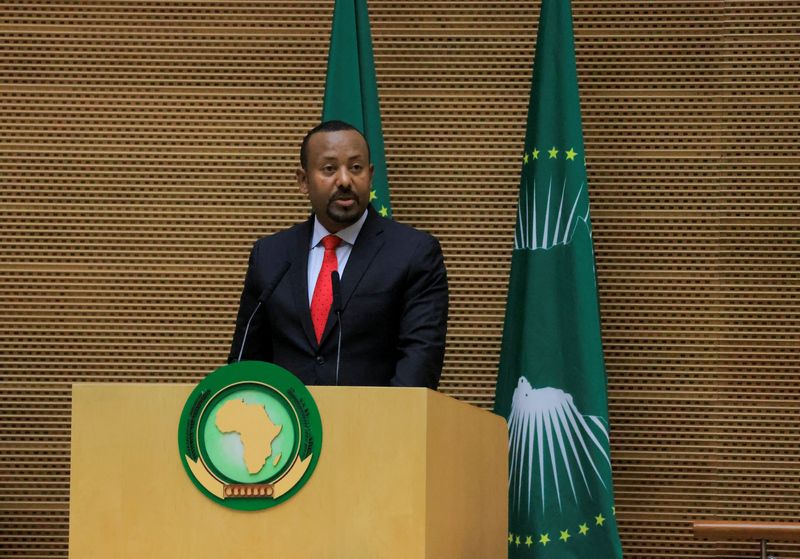Ethiopia bondholder call scheduled Thursday as default looms
2023.12.11 14:03
2/2

© Reuters. FILE PHOTO: Ethiopian Prime Minister Abiy Ahmed attends the 60th anniversary of the Organization of African Unity (OAU)/African Union (AU) at the African Union Commission (AUC) Headquarters in Addis Ababa, Ethiopia May 25, 2023. REUTERS/Tiksa Negeri/File
2/2
By Dawit Endeshaw and Karin Strohecker
ADDIS ABABA (Reuters) -Ethiopia will hold a call with its international bondholders on Thursday, a senior finance ministry official said, as the country is careering towards default, having said last week it could not pay a $33 million bond coupon due on Monday.
The finance ministry said on Friday that talks with a group of bondholders had broken down as the two sides disagreed over how long to extend the maturity and spread out the repayments of its single $1 billion international bond maturing in December 2024.
Non-payment of the bond coupon would put Ethiopia, which requested a debt overhaul under the G20 Common Framework in early 2021, on track to default after the grace period of 14 days expires.
Ethiopia had – until now – serviced interest payments on its international bond.
However, given recently secured debt service suspension agreements with official creditors, including China, and some commercial lenders, the finance ministry said in a statement on Monday that it would “seek a broadly similar treatment” from bondholders.
“It would be important to treat all our creditors equitably,” the ministry said in a statement, which seemed to echo comments last week that a payment was not on the cards.
Some holders of the international bonds had not received payment by 1700 GMT, a person familiar with the situation told Reuters.
But in separate comments made to Reuters on Monday, Eyob Tekalign, State Minister of Fiscal Policy and Public Finance, told Reuters that “authorities’ intention is to remain current on our obligations”.
He also said there would be a call with investors holding the international bond on Thursday, December 14.
The combined cost of the COVID-19 pandemic and a civil war in its northern Tigray region that ended in November 2022 has left Ethiopia, long seen as one of Africa’s most promising economies, struggling to pay its debts.
The bonds were zigzagging on Monday, initially dropping more than 1.8 cents on the dollar before reversing losses to add nearly 2 cents and being bid at 62.6 cents at 1725 GMT, according to Tradeweb data.
Outlines of the various proposals exchanged between Ethiopia’s government and its bondholders in the statement on Friday showed differences in expectations for the maturity as well as the size of the coupon and the terms and provisions.
In its final proposal, Ethiopia suggested an amortising structure of eight equal payments from July 2028 to January 2032 and a 5.5% coupon, according to ministry’s Friday statement. The proposal did not include a capital write down, which helped support bond prices.
The last bondholder group proposal wanted to see a much faster amortisation between July 2028 and July 2029 and a 6.625% coupon, the ministry said.
Bondholders also sought a loss reinstatement provision, which would see their claims reverted to pre-restructuring levels if Ethiopia were to suffer another default further down the line that would affect the bonds issued as part of the current rework.
“That was a red line,” said one bondholder.
The government’s proposal did not foresee such a provision.
“The discussion with few bondholders did not bear fruit as we did not agree on terms,” Eyob said.
“We are confident that we can work out a plan that works for both of us and have a good chance of being accepted by the OCC (hence the need for broadly similar treatment),” he wrote, referring to the official creditor committee.
Ethiopia is also seeking a four-year loan from the International Monetary Fund, which has said discussions with the government are ongoing and a staff visit to the country is “likely to take place early next year.”








